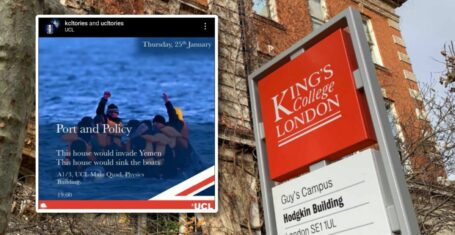
King’s has introduced a Fair Assessment Policy for grades this year
There is no safety net for 2020-21 assessments
This week KCL published an open statement to students regarding assessments for the 2020-21 academic year. The open statement links to an article which goes into much more detail on mitigation measures for 2020-21 assessments. Here’s what the statement promised students:
Is there a safety net or no detriment policy?
There is no safety net this year.
The article explains that in 2019-20 “most teaching had been delivered for the academic year” and most undergraduate students had already completed assessments in the first semester as well as previous years meaning “Assessment Boards were able to refer to marks achieved by undergraduate students before the pandemic started, which were used to create a ‘safety net’ average.”
However this year, the article explains “there is no equivalent pre-pandemic reference point in 2020-21 that can be used as a benchmark for performance and it would be neither possible nor fair to calculate an overall degree classification based purely on the average from the first year in 2018-19.”

KCL’s explanation for the lack of a safety net
Changes to individual mitigating circumstances
King’s has introduced an adapted and simplified mitigating circumstances process and removed the need for students to “provide evidence for COVID related mitigations.” The mitigating circumstances process gives students two Covid-19 related circumstance options: ‘self-isolating’ and ‘nowhere to take the assessment.’
Cohort mitigating circumstances
Year group outcomes will be reviewed for each programme against pre-pandemic year groups to ensure that each cohort “has not been unfairly disadvantaged by the impact of Covid-19 during 2020-21”.
The statement said: “Where the cohort average is outside an anticipated range of variation, adjustments will be made upwards. There will be no downwards adjustment as a result of this process.”
Progression and awards
There are new “enhanced mitigation measures” on minimum standards required for award and “borderline zones between degree classification”.
Undergraduate students who had the “safety net” applied last year will have those results incorporated into their final degree classification and award. Furthermore, they will also benefit from enhanced mitigation for “borderline” zone outcomes between degree classifications. That is, if you are within two percentage points of a higher degree classification boundary, it will be automatically calculated and applied to your final degree award.
Year 2-4 undergraduates in the borderline zone only have to have “at least 45 credits at level 6/7 at a higher classification in at least two modules” to be automatically awarded the higher classification instead of the usual requirement of 60 credits.
First-year undergraduate marks in 2020-21 will not contribute to their final degree classification.
Postgraduate taught students will receive the same “borderline zone” measures as they did in 2019-20: “If you achieve an overall score within two per cent of a higher classification boundary (58-59, 68-69) at the point of award, where at least 60 credits are in the higher classification or above, in a minimum of two modules, you will be automatically upgraded to the higher classification (Pass with Merit/Pass with Distinction).”
Related stories recommended by this writer:
• Thousands of students threaten to withhold rent at over 30 unis in historic rent strike
• KCL students unable to take online exams due to KEATS crash









































